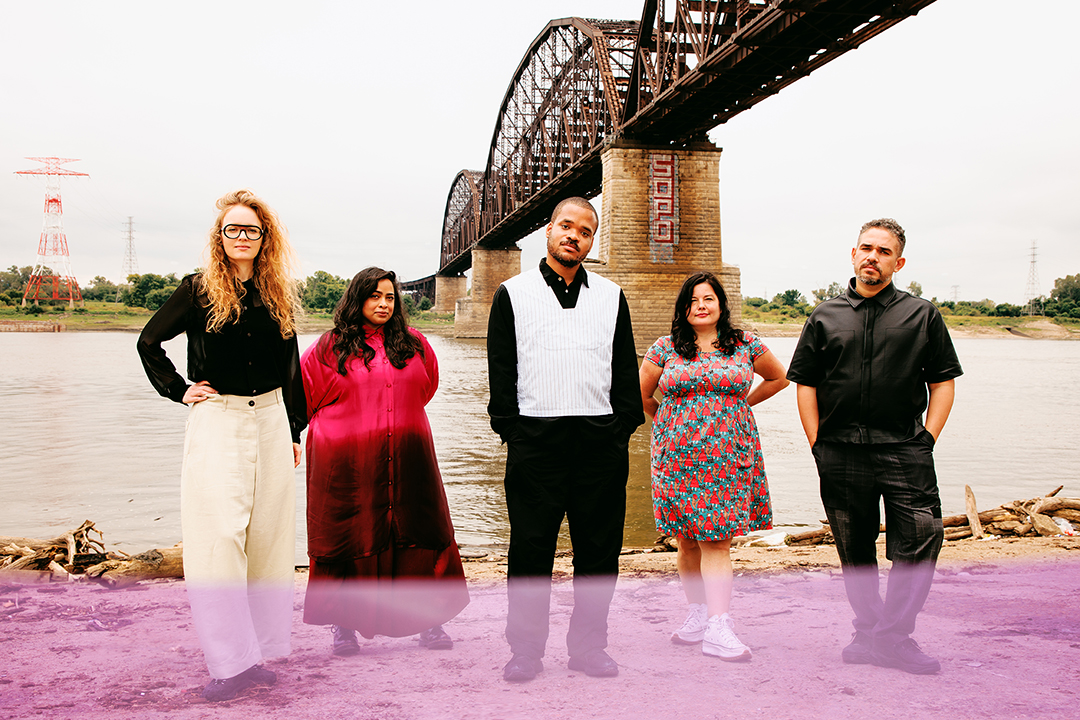IBA 11th General Assembly: Panel 2 Inclusivity and Diversity: How to Broaden the Role of Society in All Its Complexity?
28 September 2024IBA 11th General Assembly: Panel 3 Solidarity and the Global Networks: What Role Can Biennials Play in Times of Global Conflict?
3 October 2024
From left: Stefanie Hessler, Nora Khan, Jordan Carter, Wanda Nanibush, and Raphael Fonseca. Photography by Justin Mikhail Solomon/NEU ER World. Courtesy of Counterpublic.
Counterpublic 2026
September 12 – December 12, 2026
Saint Louis, MO
Counterpublic, a triennial civic exhibition in St. Louis and one of the largest public art initiatives in the country, is pleased to announce the curatorial ensemble for its third edition. Co-founded by James McAnally, Executive and Artistic Director and Lee Broughton, President, for the 2026 exhibition Counterpublic has gathered an ambitious, globally-focused team of curators to shape the new edition including Jordan Carter, Raphael Fonseca, Stefanie Hessler, Nora N. Khan, and Wanda Nanibush.
Moving from the spring to fall season, the third edition of the triennial will take place for a period of three months from September 12 to December 12, 2026. Over the course of the next two years, the ensemble will work closely with leading and emergent artists, architects, collectives, and community organizers to commission new work and continue Counterpublic’s mission to reimagine civic infrastructures with an eye toward generational change. To create an exhibition that reflects a joyous and inclusive vision of St. Louis’ future, the ensemble will explore our shared futures—climate and ecologies, education, generative technologies, Native sovereignty, food systems and more—such that the upcoming edition uplifts the region by creating direct impact in the local community and sustaining lasting change through Counterpublic’s unique model of civic investment and cultural systems building. Co-founder and Artistic Director James McAnally says: “From our inception, Counterpublic has set itself apart as a triennial that helps set the pace for the possibilities of public art in each edition. We are a listening-first platform that dedicates the first year of each cycle to engaging the many communities of St. Louis––a bellwether city globally––to set the tone and focus thematics from the ground up. We are honored to welcome an exceptionally talented cohort of curators to pick up these learnings as they cross disciplines ranging from ecologies to expanded kinship and generative technologies. We believe it is an ensemble ready to push this platform forward into new depths as a central voice of our time.” Co-founder and President Lee Broughton comments: “Counterpublic has established itself as an influential cultural destination, with our last edition drawing over 190,000 in-person visitors from St. Louis and across 36 states and 12 countries around the globe––emblematic of both the decentralization of the art world and larger shift towards embracing artists at the forefront of social practice. Following our second edition in 2023, which included permanent installations and projects with lasting socio-political impact such as a collaboration with New Red Order to rematriate the last remaining sacred Indigenous mound in St. Louis to the Osage Nation, we are thinking even more ambitiously about the collaborations through this year’s curatorial ensemble. Our lens will bring new perspectives and approaches to our collective near futures, engaging the community, and using art as a tool for generational change.”
The term subaltern counterpublic was conceptualized by Nancy Fraser in 1997 as “parallel discursive arenas where members of subordinated social groups invent and circulate counterdiscourses, which in turn permit them to formulate oppositional interpretations of their identities, interests, and needs.” Following an exhibition titled “Counterpublic” organized by St. Louis-based nonprofit The Luminary in 2015, curated by Brea Youngblood and James McAnally, an expanded iteration opened on Cherokee Street as the inaugural edition of the triennial in 2019, organized by Katherine Simóne Reynolds, Youngblood, and McAnally. Counterpublic 2019 brought groundbreaking contemporary art to the local businesses and organizations—barbershops, bakeries, parks, and taquerias—that anchor Cherokee Street and the surrounding neighborhoods of South St. Louis and serve as gathering spaces for the many communities living in the area. Following its establishment as a nonprofit in 2021 by Lee Broughton and James McAnally, the 2023 edition was realized through thirty-seven commissions across forty sites along the six-mile stretch of Jefferson Avenue––a historic street in St. Louis that runs vertically through the entire city. Ahead of its second edition, Counterpublic compiled a community report generated from conversations with nearly 1,000 neighbors and stakeholders across St. Louis over the course of a year—which served to shape Counterpublic 2023’s focus on public memory and reparative futures. As such, several of the key commissioned projects began to think beyond the lifespan of the exhibition format. Central among these long-term goals is Counterpublic’s ongoing work to rematriate Sugarloaf Mound, the last remaining Indigenous mound in St. Louis, to the Osage Nation, who are among the descendants of the Mississippians who constructed the mounds between roughly 800 and 1450 AD as sacred, ceremonial sites. Following this second edition, Counterpublic leadership worked with the Brown School of Social Work Evaluation Center at Washington University in St. Louis to analyze the social and economic impact of the triennial; understand visitor, partner, and community member experiences; and document and collect foundational data from the exhibition in a major report that compared the stated goals of the project determined in collaboration with community members and stakeholders with the outcomes that resulted. Each stated goal was either met or exceeded, and the triennial saw a more than threefold return on investment for the region, with its economic impact exceeding $15M. This process and the results that informed it will be critical in shaping the 2026 edition.
Counterpublic 2026 will be curated by St. Louis native Jordan Carter, a curator and co-department head at Dia Art Foundation, where he has curated exhibitions of work by stanley brouwn, Felix Gonzalez-Torres, Maren Hassinger, Mary Heilmann, Cameron Rowland, and Lucas Samaras, among others; Raphael Fonseca, a Rio-born curator who serves as the curator of modern and contemporary Latin American art at the Denver Art Museum, is deeply interested in transhistorical approaches and how artists explore humor, absurdity, mass culture, and banality; Stefanie Hessler, a curator, writer, and the Director of Swiss Institute in New York, where she invites artists to experimentally reshape the institution through ecological and technological interventions; Nora N. Khan, an independent critic, educator, and curator––most recently the co-curator of the Biennale de l’Image en Mouvement––whose research focus is critical artistic collaboration with generative technologies; and Wanda Nanibush, a Toronto-based curator and founding director of aabaakwad––an international yearly gathering of Indigenous curators, writers and artists that last took place at Venice Biennale––who recently won the Toronto Book Award for her co-authored book Moving the Museum which chronicles some of her groundbreaking work at the Art Gallery of Ontario as the inaugural curator of Indigenous Art. The curatorial ensemble is a part of the broader team involved in staging the third edition of the project, working alongside President Lee Broughton, Executive and Artistic Director James McAnally, and Assistant Curator Charlie Farrell, as well as other community members and local stakeholders. Counterpublic 2026 will follow in the footsteps of its second edition as one of the most ambitious contemporary art platforms in the nation.
Jordan Carter comments: “Having grown up in St. Louis, I am excited to meaningfully contribute to my hometown through reverberating reconsiderations of the intersections of art and place. Within the multisited civic context of Counterpublic, I look forward to working alongside my inspiring co-curators to realize the worldbuilding visions of artists in ways that bridge artistic intent and social impact. Complementing, extending, and collaborating within the city’s vibrant arts ecosystem, I intend to cultivate the possibilities of conceptual and site-sensitive practices, repositioning art from the pedestal to pedestrian space.”
Raphael Fonseca comments: “I look forward to working collaboratively with my colleagues and organizing a triennial that brings together a wide variety of visual artists and creators together, and serves as a vital educational role in making visible the rich history of St. Louis, its cultural layers, and its stories full of joy and trauma altogether. After these two years, I hope to become a different person and a different curator.”
Stefanie Hessler comments: “As a curator committed to experimental and conceptually rigorous artistic practices that imagine different futures, I’m drawn to Counterpublic’s dedication to put artists first, to listen to the needs and desires of its St. Louis communities, to build infrastructure both materially and culturally, and to create an artistic platform for lasting change. I’m excited to work alongside this brilliant curatorial ensemble and germinate the seeds for sustained and sustainable change through collective learning and unlearning, experimentation, and joy.”
Nora N. Khan comments: “From my first visit to Counterpublic in 2019, I was drawn into the radical ethos of the triennial, in which artists developed intimate, thrilling site-specific commissions. The first edition’s wild ambition and utterly fresh approach to exhibition-making offsite and offgrid––stayed with me for years. I’m delighted by Counterpublic’s challenge to each curator to deeply root their research in the history and present of St. Louis, and look forward to supporting artists in their imagining of generational change.”
Wanda Nanibush comments: “I am very excited to work with Counterpublic because of both the stated commitment to and the actual actions on the lasting impact of the arts on St.Louis. We hope to expand this in 2026 with profound engagements in and with communities where the arts can be a life changing experience. It is this marriage of artistic experimentation and long lasting community impact that is my goal. I would like to see the fun, loving, deep, committed, connected side of St. Louis brought to the fore through art works and performances of Counterpublic.”
About Counterpublic:
Actively engaged with both its neighbors in St. Louis and national conversations on the role of contemporary art, Counterpublic is a 501c3 nonprofit that aims to be a beacon of creative thinking and community engagement—an inclusive art platform that expands social, political, and civic horizons. Working in public places, cultural institutions, historic houses, and community gathering spaces, Counterpublic commissions dozens of artists, collectives, and community organizers to make and present works in St. Louis that engage the city’s histories and imagine new futures. The three month festival also includes active education, research, residencies, performances, publications, public projects, and commissions. For more information, visit counterpublic.org.



